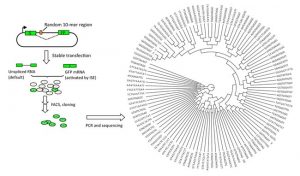
The Wang Lab had a paper published in Nature Structural & Molecular Biology September 16, 2012 titled, “Intronic splicing enhancers, cognate splicing factors and context-dependent regulation rules.” Yang Wang, Research Assistant Professor in the Wang lab, is first author on paper. Along with Zefeng Wang, co-authors are Meng Ma, from UNC and Xinshu Xiao at UCLA. Congratulations to all!
Nature Structural & Molecular Biology (2012) doi:10.1038/nsmb.2377
From the papers abstract:
Most human genes produce multiple splicing isoforms with distinct functions. To systematically understand splicing regulation, we conducted an unbiased screen and identified >100 intronic splicing enhancers (ISEs), clustered by sequence similarity. All ISEs functioned in multiple cell types and in heterologous introns, and patterns of distribution and conservation across pre-mRNA regions were similar to those of exonic splicing silencers. Consistently, all ISEs inhibited use of splice sites from exons. Putative trans-factors of each ISE group were identified and validated. Five distinct groups were recognized by hnRNP H and hnRNP F, whose C-terminal domains were sufficient to render context-dependent activities of ISEs. The sixth group was controlled by factors that either activate or suppress splicing. We provide a comprehensive picture of general ISE activities and suggest new models of how single elements can function oppositely, depending on locations and binding factors.
Figure below: click for enlargement.

